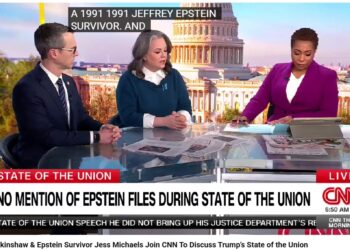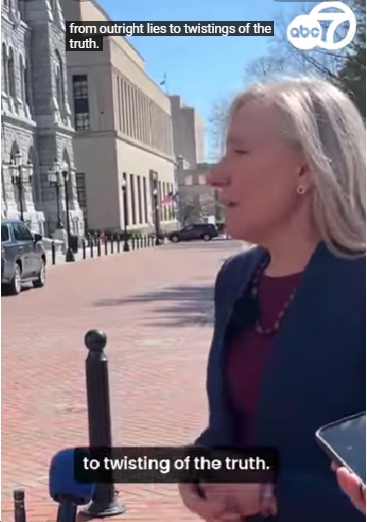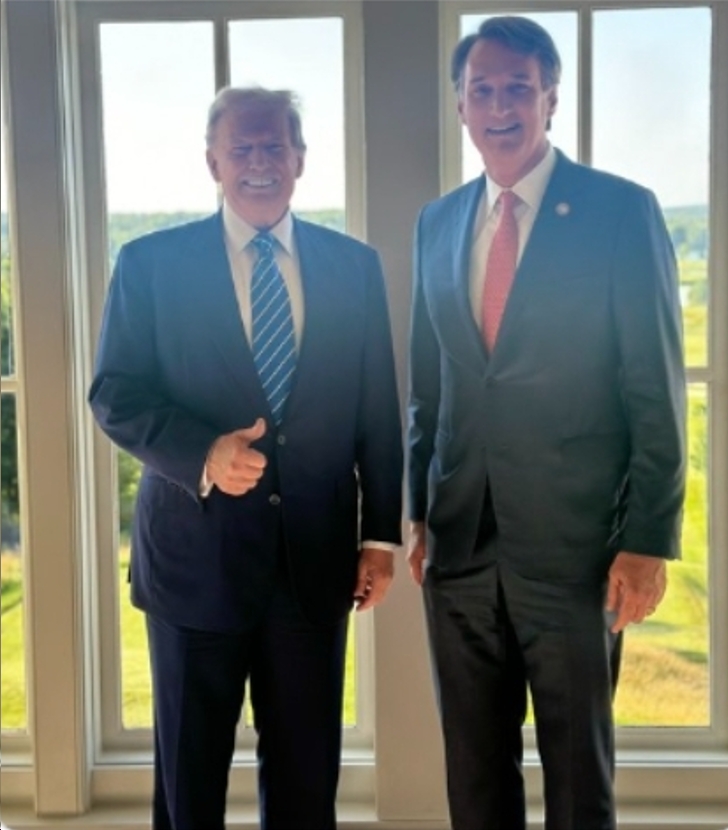I can’t believe I’m putting George W. Bush on the front page of Blue Virginia, but that’s where we’re at right now in this country. Yes, George W. Bush is a shining statesman compared to Donald Trump, who Bush here calls out – without naming him – for his encouragement of “casual cruelty,” “bullying,” “bigotry,” “white supremacy,” “conspiracy theories,” “outright fabrication,” and “a trend in Western countries away from global engagement and democratic confidence,” among other things. The question for Republicans not named “Donald Trump” – including Virginia Republicans like Ed Gillespie, Jill Vogel, John Adams, John Whitbeck, Corey Stewart, etc. – is whether they are more in sync with the Trump version of their party or the George W. Bush version. And no, they can’t have both or be both. Instead, to quote one of their heroes, Ronald Reagan – a man who had many flaws, but also in the end would have (I believe) come down strongly against Trump and all Trump stands for – this is truly “A Time for Choosing.” Which side will you be on, Ed? Jill? John? John? Corey? So far, sad to say, you’re all failing the test of American moral leadership – miserably and shamefully, at that.
With that, here’s the video, with a partial transcript (bolding added by me for emphasis) below.
P.S. I must say, as admirable as this speech is, it’s almost impossible to reconcile with Bush’s campaigning for the Trump-like Gillespie, Vogel and Adams. Compartmentalization? Misguided loyalty? Got me, but I’m going to focus on this speech for the moment and urge Virginia Republicans to seriously think about their own role in facilitating all the bad things Bush talks about here.
We are gathered in the cause of liberty this is a unique moment. The great democracies face new and serious threats – yet seem to be losing confidence in their own calling and competence. Economic, political and national security challenges proliferate, and they are made worse by the tendency to turn inward. The health of the democratic spirit itself is at issue. And the renewal of that spirit is the urgent task at hand.
Since World War II, America has encouraged and benefited from the global advance of free markets, from the strength of democratic alliances, and from the advance of free societies. At one level, this has been a raw calculation of interest. The 20th century featured some of the worst horrors of history because dictators committed them. Free nations are less likely to threaten and fight each other.
And free trade helped make America into a global economic power.
For more than 70 years, the presidents of both parties believed that American security and prosperity were directly tied to the success of freedom in the world. And they knew that the success depended, in large part, on U.S. leadership. This mission came naturally, because it expressed the DNA of American idealism.
We know, deep down, that repression is not the wave of the future. We know that the desire for freedom is not confined to, or owned by, any culture; it is the inborn hope of our humanity. We know that free governments are the only way to ensure that the strong are just and the weak are valued. And we know that when we lose sight of our ideals, it is not democracy that has failed. It is the failure of those charged with preserving and protecting democracy.
This is not to underestimate the historical obstacles to the development of democratic institutions and a democratic culture. Such problems nearly destroyed our country – and that should encourage a spirit of humility and a patience with others. Freedom is not merely a political menu option, or a foreign policy fad; it should be the defining commitment of our country, and the hope of the world.
That appeal is proved not just by the content of people’s hopes, but a noteworthy hypocrisy: No democracy pretends to be a tyranny. Most tyrannies pretend they are democracies. Democracy remains the definition of political legitimacy. That has not changed, and that will not change.
Yet for years, challenges have been gathering to the principles we hold dear. And, we must take them seriously. Some of these problems are external and obvious. Here in New York City, you know the threat of terrorism all too well. It is being fought even now on distant frontiers and in the hidden world of intelligence and surveillance. There is the frightening, evolving threat of nuclear proliferation and outlaw regimes. And there is an aggressive challenge by Russia and China to the norms and rules of the global order – proposed revisions that always seem to involve less respect for the rights of free nations and less freedom for the individual.
These matters would be difficult under any circumstances. They are further complicated by a trend in Western countries away from global engagement and democratic confidence. Parts of Europe have developed an identity crisis. We have seen insolvency, economic stagnation, youth unemployment, anger about immigration, resurgent ethno-nationalism, and deep questions about the meaning and durability of the European Union.
America is not immune from these trends. In recent decades, public confidence in our institutions has declined. Our governing class has often been paralyzed in the face of obvious and pressing needs. The American dream of upward mobility seems out of reach for some who feel left behind in a changing economy. Discontent deepened and sharpened partisan conflicts. Bigotry seems emboldened. Our politics seems more vulnerable to conspiracy theories and outright fabrication.
There are some signs that the intensity of support for democracy itself has waned, especially among the young, who never experienced the galvanizing moral clarity of the Cold War, or never focused on the ruin of entire nations by socialist central planning. Some have called this “democratic deconsolidation.” Really, it seems to be a combination of weariness, frayed tempers, and forgetfulness.
We have seen our discourse degraded by casual cruelty. At times, it can seem like the forces pulling us apart are stronger than the forces binding us together. Argument turns too easily into animosity. Disagreement escalates into dehumanization. Too often, we judge other groups by their worst examples while judging ourselves by our best intentions – forgetting the image of God we should see in each other.
We’ve seen nationalism distorted into nativism – forgotten the dynamism that immigration has always brought to America. We see a fading confidence in the value of free markets and international trade – forgetting that conflict, instability, and poverty follow in the wake of protectionism.
We have seen the return of isolationist sentiments – forgetting that American security is directly threatened by the chaos and despair of distant places, where threats such as terrorism, infectious disease, criminal gangs and drug trafficking tend to emerge.
In all these ways, we need to recall and recover our own identity. Americans have a great advantage: To renew our country, we only need to remember our values.
This is part of the reason we meet here today. How do we begin to encourage a new, 21st century American consensus on behalf of democratic freedom and free markets? That’s the question I posed to scholars at the Bush Institute. That is what Pete Wehner and Tom Melia, who are with us today, have answered with “The Spirit of Liberty: At Home, In The World,” a Call to Action paper.
The recommendations come in broad categories. Here they are: First, America must harden its own defenses. Our country must show resolve and resilience in the face of external attacks on our democracy. And that begins with confronting a new era of cyber threats.
America is experiencing the sustained attempt by a hostile power to feed and exploit our country’s divisions. According to our intelligence services, the Russian government has made a project of turning Americans against each other. This effort is broad, systematic and stealthy, it’s conducted across a range of social media platforms. Ultimately, this assault won’t succeed. But foreign aggressions – including cyber-attacks, disinformation and financial influence – should not be downplayed or tolerated. This is a clear case where the strength of our democracy begins at home. We must secure our electoral infrastructure and protect our electoral system from subversion.
The second category of recommendations concerns the projection of American leadership – maintaining America’s role in sustaining and defending an international order rooted in freedom and free markets.
Our security and prosperity are only found in wise, sustained, global engagement: In the cultivation of new markets for American goods. In the confrontation of security challenges before they fully materialize and arrive on our shores. In the fostering of global health and development as alternatives to suffering and resentment. In the attraction of talent, energy and enterprise from all over the world. In serving as a shining hope for refugees and a voice for dissidents, human rights defenders, and the oppressed.
We should not be blind to the economic and social dislocations caused by globalization. People are hurting. They are angry. And, they are frustrated. We must hear them and help them. But we can’t wish globalization away, any more than we could wish away the agricultural revolution or the industrial revolution. One strength of free societies is their ability to adapt to economic and social disruptions.
And that should be our goal: to prepare American workers for new opportunities, to care in practical, empowering ways for those who may feel left behind. The first step should be to enact policies that encourage robust economic growth by unlocking the potential of the private sector, and for unleashing the creativity and compassion of this country.
A third focus of this document is strengthening democratic citizenship. And here we must put particular emphasis on the values and views of the young.
Our identity as a nation – unlike many other nations – is not determined by geography or ethnicity, by soil or blood. Being an American involves the embrace of high ideals and civic responsibility. We become the heirs of Thomas Jefferson by accepting the ideal of human dignity found in the Declaration of Independence. We become the heirs of James Madison by understanding the genius and values of the U.S. Constitution. We become the heirs of Martin Luther King, Jr., by recognizing one another not by the color of their skin, but by the content of their character.
This means that people of every race, religion, and ethnicity can be fully and equally American. It means that bigotry or white supremacy in any form is blasphemy against the American creed. (Applause.)
And it means that the very identity of our nation depends on the passing of civic ideals to the next generation.




![Video: Speaking at Democratic AG’s Conference, Jay Jones Says Trump “probably doesn’t like the fact that I’m sitting in this seat, but here I am ready to defend [against] anything that he’s trying to do.”](https://bluevirginia.us/wp-content/uploads/2026/02/jonessanfran.jpg)
















